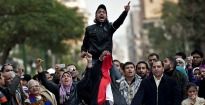Egypt Hit By Massive Strikes
Protesters demanding the overthrow of President Hosni Mubarak appeared on Wednesday to have recaptured the initiative in their battle with his government, demonstrating a new ability to mobilize thousands to take over Cairo’s streets beyond Tahrir Square and to spark labor unrest.
As reports filtered in of strikes and unrest spreading to other parts of the city and the country, the government seemed to dig in deeper. Mr. Mubarak’s handpicked successor, Vice President Omar Suleiman, warned Tuesday that the only alternative to constitutional talks was a “coup” and added: “We don’t want to deal with Egyptian society with police tools.”
But the pressure on Mr. Mubarak’s government was intensifying, a day after the largest crowd of protesters in two weeks flooded Cairo’s streets and the United States delivered its most specific demands yet, urging swift steps toward democracy. Some of the protesters drew new inspiration from the emotional interview on Egypt’s most popular talk show with Wael Ghonim, the online political organizer who was detained for two weeks.
At dawn on Wednesday, the 16th day of the uprising, hundreds of pro-democracy demonstrators remained camped out at Parliament, where they had marched for the first time on Tuesday. There were reports of thousands demonstrating in several other cities around the country while protesters began to gather again in Tahrir Square, a few blocks from Parliament.
By midday, hundreds of workers from the Health Ministry, adjacent to Parliament and a few hundred yards from Tahrir Square, also took to the streets in a protest whose exact focus was not immediately clear, Interior Ministry officials said.
Violent clashes between opponents and supporters of Mr. Mubarak led to more than 70 injuries in recent days, according to a report by Al Ahram — the flagship government newspaper and a cornerstone of the Egyptian establishment — while government officials said the protests had spread to the previously quiet southern region of Upper Egypt.
In Port Said, a city of 600,000 at the mouth of the Suez Canal, protesters set fire to a government building and occupied the city’s central square. There were unconfirmed reports that police fired live rounds on protesters on Tuesday in El Kharga, 375 miles south of Cairo, resulting in several deaths. Protesters responded by burning police stations and other government buildings on Wednesday, according to wire reports.
On Tuesday, the officials said, thousands protested in the province of Wadi El Jedid. One person died and 61 were injured, including seven from gunfire by the authorities, the officials said. Television images also showed crowds gathering in Alexandria, Egypt’s second-largest city.
Before the reports of those clashes, Human Rights Watch reported that more than 300 people have been killed since Jan. 25.
Increasingly, the political clamor for Mr. Mubarak’s ouster seemed to be complemented by strikes in Cairo and elsewhere.
In the most potentially significant action, about 6,000 workers at five service companies owned by the Suez Canal Authority — a major component of the Egyptian economy — began a sit-in on Tuesday night. There was no immediate suggestion of disruptions to shipping in the canal, a vital international waterway leading from the Mediterranean to the Red Sea. But Egyptian officials said that total traffic declined by 1.6 percent in January, though it was up significantly from last year.
More than 2,000 textile workers and others in Suez demonstrated as well, Al Ahram reported, while in Luxor thousands hurt by the collapse of the tourist industry marched to demand government benefits. There was no immediate independent corroboration of the reports.
At one factory in the textile town of Mahalla, more than striking 1,500 workers blocked roads, continuing a long-running dispute with the owner. And more than 2,000 workers from the Sigma pharmaceutical company in the city of Quesna went on strike while some 5,000 unemployed youth stormed a government building in Aswan, demanding the dismissal of the governor.
For many foreign visitors to Egypt, Aswan is known as a starting point or destination for luxury cruises to and from Luxor on the Nile River. The government’s Ministry of Civil Aviation reported on Wednesday that flights to Egypt had dropped by 70 percent since the protests began.
Click here to read more.


